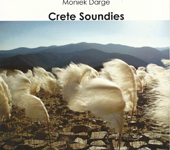|
|
 |
Dusted Reviews
Artist: Moniek Darge Album: Crete Soundies Label: Kye Review date: May. 21, 2010 |

|
|
|
 |
Inspired by Plato’s utopian vision, ancient cult religion and modern-day Crete, Moniek Darge’s latest release is a love letter to the island, past and present. The disc is equal parts anthropology and mysticism, a document of two Cretes: that which Dagre experienced between 2006 and 2009, and a Crete that lives only in ancient mythology, philosophy and theology. These three “soundies” are relatively simple statements, but are often all the more mysterious for it. Mixing direct documentation with more abstract representation, the Belgian Darge puts the listener on an island of Crete that one can step on, live on and dream of, conjuring a land that exists on world maps as well as in imagination.
Crete Soundies’ three tracks run approximately 20 minutes apiece, and each creates a decidedly different atmosphere, mining the sounds of surrounding environments and performances from Darge and her collaborators. A significant element of Darge’s creations is the human voice — sometimes a part of the field recordings, sometimes an accompaniment performed by Darge and her fellow participants in the Levka Ori creative encounters program. The wordless intonations and plaintive melodies sung in the foreground of “Magnesia” contribute vitally to the track’s solemn tone, while the voices in “East Crete” are simply part of the panorama that is presented in the album’s purest presentation of everyday Cretan sound. As winds whip around a mountaintop and cowbell clatters lazily, “Anemos” presents voices (assumedly speaking Cretan) that could be telling a fragmented tale through smatterings of speech and song. Darge’s narratives are more suggestion than storytelling, making Crete Soundies a sort of avant-impressionism. Darge evokes hazy visions of Crete, albeit through a fractured lens, the true picture of the island obscured.
By placing the listener in the unfamiliar environs of her reconfigured Crete, Darge’s music has a sense of transportation at its core. Regardless of the listener’s willingness to travel, however, there are roadblocks keeping Crete Soundies from being a wholly immersive trip. The more subtle means of recontextualization used in “East Crete” make it the most successful of the disc’s three tracks. On “Magnesia” and “Anemos” the results are cloudier, as the more obvious manipulations of Darge’s hand often attract attention, making the periods of absorbed listening less frequent. The power of these creations isn’t emboldened by their peculiarity; rather, the dream-Crete Darge envisioned is too often interrupted by reminders of its construction. Unexpected voices and sudden edits can jar the mind from its reverie in unceremonious fashion.
When the stitches between sounds are less visible, Crete Soundies can take the listener on a beguiling trip. When one is too often forced to contemplate the fabrication of Darge’s Cretan creation, the album rarely ascends to the heights of the Lefka Ori, and the listener’s feet stay firmly on the ground.
By Adam Strohm
|







